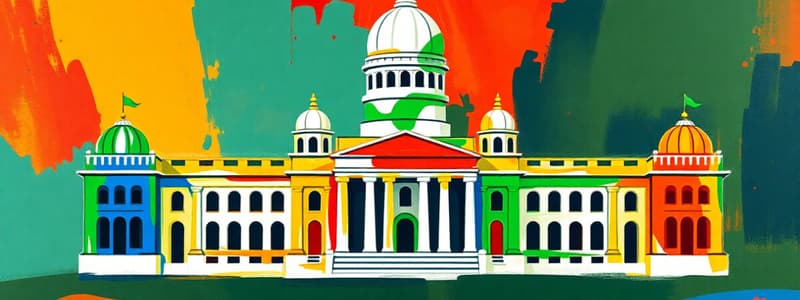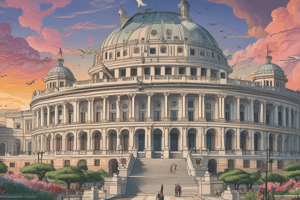Podcast
Questions and Answers
What is the primary role of the judiciary in Bangladesh?
What is the primary role of the judiciary in Bangladesh?
The primary role of the judiciary in Bangladesh is to establish justice, punish law infringers, and protect the individual freedoms of citizens.
How is the Supreme Court of Bangladesh structured?
How is the Supreme Court of Bangladesh structured?
The Supreme Court of Bangladesh consists of two main divisions: the High Court Division and the Appellate Division.
Who appoints the judges of the Supreme Court's divisions in Bangladesh?
Who appoints the judges of the Supreme Court's divisions in Bangladesh?
The judges of both the High Court Division and the Appellate Division are appointed by the President of Bangladesh.
What is the process for unresolved disputes in Bangladesh's judicial system?
What is the process for unresolved disputes in Bangladesh's judicial system?
How does the Supreme Court of Bangladesh serve as the Guardian of the Constitution?
How does the Supreme Court of Bangladesh serve as the Guardian of the Constitution?
What is the role of the Jatiyo Sangsad in amending the constitution of Bangladesh?
What is the role of the Jatiyo Sangsad in amending the constitution of Bangladesh?
What majority is required for the Jatiyo Sangsad to successfully amend the constitution?
What majority is required for the Jatiyo Sangsad to successfully amend the constitution?
Why might the constitutional amendment process in Bangladesh be considered significant?
Why might the constitutional amendment process in Bangladesh be considered significant?
Which parliamentary body is responsible for proposing amendments to the constitution?
Which parliamentary body is responsible for proposing amendments to the constitution?
What is the role of the Cabinet in relation to the parliament in Bangladesh?
What is the role of the Cabinet in relation to the parliament in Bangladesh?
What might be a limitation of the parliamentary system in Bangladesh regarding constitutional amendments?
What might be a limitation of the parliamentary system in Bangladesh regarding constitutional amendments?
List three main administrative functions of the executive organ in Bangladesh.
List three main administrative functions of the executive organ in Bangladesh.
How does the process of amending the constitution reflect the public's wishes in Bangladesh?
How does the process of amending the constitution reflect the public's wishes in Bangladesh?
What is the relationship between the majority required for constitutional amendments and the potential for political stability?
What is the relationship between the majority required for constitutional amendments and the potential for political stability?
How does the President of Bangladesh influence military functions?
How does the President of Bangladesh influence military functions?
What is one major limitation faced by the executive organ in Bangladesh?
What is one major limitation faced by the executive organ in Bangladesh?
What role does the president of Bangladesh play in the legislative process related to constitutional amendments?
What role does the president of Bangladesh play in the legislative process related to constitutional amendments?
How does the Parliament of Bangladesh differ from the legislature in other countries?
How does the Parliament of Bangladesh differ from the legislature in other countries?
What powers does the legislature hold in Bangladesh regarding laws?
What powers does the legislature hold in Bangladesh regarding laws?
In the context of foreign relations, what role does the President of Bangladesh play?
In the context of foreign relations, what role does the President of Bangladesh play?
Identify one major factor contributing to the ineffective local government system in Bangladesh.
Identify one major factor contributing to the ineffective local government system in Bangladesh.
Flashcards
Bangladesh Legislature
Bangladesh Legislature
The legislative branch of the Bangladeshi government, called the Jatiyo Sangsad, responsible for creating laws.
Jatiyo Sangsad
Jatiyo Sangsad
The unicameral parliament of Bangladesh.
Parliamentary Election Qualifications
Parliamentary Election Qualifications
To be eligible to run for parliament, citizens must be Bangladesh citizens and at least 25 years old.
Parliamentary Election Disqualifications
Parliamentary Election Disqualifications
Signup and view all the flashcards
Law Making (Parliamentary Function)
Law Making (Parliamentary Function)
Signup and view all the flashcards
Budgetary Control (Parliamentary Function)
Budgetary Control (Parliamentary Function)
Signup and view all the flashcards
Executive Control (Parliamentary Function)
Executive Control (Parliamentary Function)
Signup and view all the flashcards
Constitutional Amendment (Parliamentary Function)
Constitutional Amendment (Parliamentary Function)
Signup and view all the flashcards
What is the highest court in Bangladesh?
What is the highest court in Bangladesh?
Signup and view all the flashcards
Appellate Division
Appellate Division
Signup and view all the flashcards
High Court Division
High Court Division
Signup and view all the flashcards
Village Courts
Village Courts
Signup and view all the flashcards
Judicial System Hierarchy
Judicial System Hierarchy
Signup and view all the flashcards
Who is the Executive responsible to?
Who is the Executive responsible to?
Signup and view all the flashcards
What are Executive Agencies?
What are Executive Agencies?
Signup and view all the flashcards
What are the Administrative Functions of the Executive?
What are the Administrative Functions of the Executive?
Signup and view all the flashcards
What are the Legislative Functions of the Executive?
What are the Legislative Functions of the Executive?
Signup and view all the flashcards
What are the President's Military Powers?
What are the President's Military Powers?
Signup and view all the flashcards
What is the President's role in Foreign Relations?
What is the President's role in Foreign Relations?
Signup and view all the flashcards
What's the Executive's role in the Budget?
What's the Executive's role in the Budget?
Signup and view all the flashcards
What is a defining characteristic of the Bangladeshi Parliament?
What is a defining characteristic of the Bangladeshi Parliament?
Signup and view all the flashcards
Study Notes
Organs of the Government of Bangladesh
- The Bangladeshi government has three branches: Legislative, Executive, and Judicial.
- These branches are governed by the Constitution.
Government Concept
- Government is the process of managing and overseeing a state's policies.
- It involves the means by which state policies are enforced and implemented.
- The executive branch is responsible for the daily administration and implementing laws.
- The legislature is involved in creating laws and can amend current ones .
- The judicial branch interprets laws and settles disputes.
Organs of the Government of Bangladesh
- Bangladesh is a unitary, independent, and sovereign parliamentary republic.
- The President is the head of state and is elected by Parliament for a five-year term.
- The President commands the armed forces.
- The government is democratic, with a separation of powers among the legislature, executive, and judiciary.
Executive Branch
- The executive branch or administration is in charge of overseeing the governance of the country and conducting administrative duties.
- It regulates state policies.
- It enacts and maintains law and order.
- The executive branch carries out the resolutions made by the legislature.
- It includes all administrative employees, including the President, cabinet, government officials, security and law enforcement agencies, diplomats, officers, and even the Chowkidar.
- The executive power of the Republic is exercised by or on the advice of the Prime Minister, who is supported by the majority members of parliament.
- The Cabinet, headed by the Prime Minister, is the executive arm of the government.
- Ministers, State Ministers, and Deputy Ministers are appointed by the Prime Minister.
- Each ministry is headed by a minister or a state minister.
- Several executive agencies are below the ministries to implement government policies.
- The country administratively divided into Divisions, Districts, and Upazilas.
- Ministers are responsible for maintaining law and order and for running the administration.
- The executive branch introduces bills to the legislature.
- The President has the power to promote, demote, and dismiss military officers.
- The President appoints diplomatic representatives and receives those from foreign countries.
- The executive branch prepares the budget and tries to get it passed by the legislature.
Executive Branch Limitations
- There is a lack of cooperation and coordination between government officials.
- There is a lack of enthusiasm to improve bureaucratic methods.
- There are inadequate ICT facilities.
- Government officials and employees lack skills and training.
- Politics influences government functions.
- There is a lack of proactive leadership.
- Traditional rules and regulations are adhered to.
- Cabinet members lack sufficient qualifications.
- There is a highly centralized government system.
- Ineffective local government exists.
Legislative Branch
- The legislature (or Parliament) is responsible for creating, modifying, or repealing laws, as long as those laws do not contradict the Constitution.
- It is composed of elected or nominated members.
- The name of the Bangladesh legislature is Parliament (Jatiyo Sangsad).
- The Bangladesh legislature is unicameral.
- The US legislature is Congress.
- The legislatures of most Islamic countries are called Majlis.
- Some countries have single-house parliaments, and others have two.
Legislative Branch Functions
- Create new laws.
- The power to adjust the budget.
- Has the right to challenge the executive branch.
- The right to impeach the President.
- Parliament takes part in presidential elections.
- The ability to adjust the constitution (with a two-thirds majority of the legislature).
- To be a reflection of public opinion.
Legislative Branch Limitations
- Lack of proper practice of democratic processes.
- Unsatisfactory parliamentary sessions.
- Speaker and deputy speaker roles are not proper.
- Ineffective or poor political dialogue and culture.
- The election commission is ineffective.
- The role of political parties is unsatisfactory.
- Inadequate use of ICT's in the country.
- Lack of adequate citizen responsibility and involvement.
- The military's role in the political process is also problematic.
- There is inconsistent political stability.
Judicial Branch
- The judiciary is the branch of government responsible for establishing justice.
- The goal of the judiciary is to establish and maintain justice.
- Judges and court systems are part of the judicial branch.
- The judiciary punishes lawbreakers and protects the rights of individuals.
- The judiciary is at the highest level of the country's legal system, with the Supreme Court at the apex.
- The Supreme Court serves as a protector of the Constitution and enforces citizens' fundamental rights.
Judicial Branch Functions
- Interpreting the laws.
- Protecting the country's Constitution.
- Deciding legal cases.
- Protecting fundamental rights.
- Protecting civil rights.
- Offering advisory functions.
Administrative system in Bangladesh
- The administrative system is divided into central, divisional, and upazila levels.
- The central administration is run by the Minister.
- The divisional level has a divisional commissioner who oversees district and upazila administrations.
- The district administration is run by a Deputy Commissioner.
- The upazila administration is led by the Upazila Nirbahi Officer (UNO).
Local Autonomy
- Local autonomy means self-governance, involving elected officials accountable to the people.
- Features include legal basis, an elected body, public involvement in decisions, tax collection, and expanded multiple functions, in addition to plan design and implementation.
- Local autonomy units are not completely independent.
- The local autonomy organizations in Bangladesh include the Union Parishad, the Upazila Parishad, the District Parishad, Municipality (Pourashava) and the City Corporation.
Studying That Suits You
Use AI to generate personalized quizzes and flashcards to suit your learning preferences.




